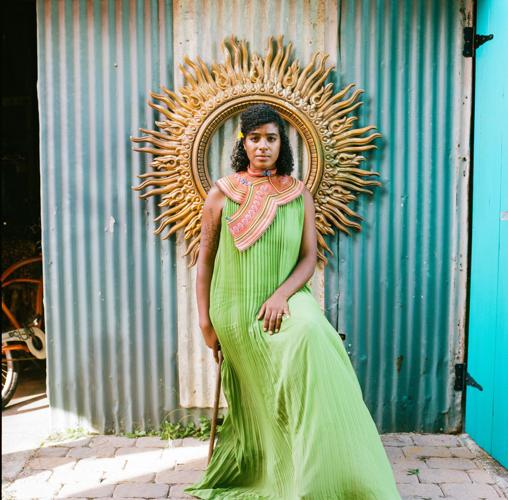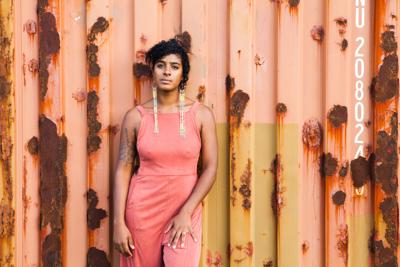Leyla McCalla didn’t intend to make a “protest album.”
On her previous two albums, McCalla’s gentle voice floats alongside her cello, a vessel for her plucked folk-poetry and Haitian music, a reflection of her roots and past invigorated by the fluid present.
Her debut album, 2014’s “Vari-Colored Songs: A Tribute to Langston Hughes,” channeled the poet’s work to tell McCalla’s own story, carving infinite tributaries that spring from her interpretations of Haitian folk music.
On 2016’s “A Day for the Hunter, a Day for the Prey,” her arrangements reflect the ebb and flow of oppression and resistance, displacement and settlement, community and isolation — in Haiti, specifically, but in the ongoing global refugee crisis and the immigrant experience.
“How have my previous records not been considered protest albums?” she says. “I never was like, ‘I’m a protest singer.’ But how am I not? Sure, if you want to call me that, that’s fine with me. I’m fine to protest things. But that’s why I make music, to talk about these social issues and try to process them and be a part of the dialogue about them.”
On her latest album, January’s “Capitalist Blues,” she introduces irreverent blues and discordant rock ’n’ roll, laced with Southern soul, Louisiana music and New Orleans jazz and R&B and the kinds of street music that has seeped into her life in New Orleans. But the album threads her visions of pan-African and pan-Caribbean soundscapes with lyrics encompassing the anxieties and disasters of the political moment, from the election of President Donald Trump to the state of socio-economic collapse.
Also among the sounds and inspiration behind the album are Brazil’s revolutionary Tropicalista Caetano Veloso and books by Ned Sublette — “The World That Made New Orleans” and “American Slave Coast: A History of the Slave-Breeding Industry” — along with the barrage of news and social media-enabled windows into the damaged and oppressed corners of the world.
“I’m not playing cello on any of the songs on this record,” she says. “I feel like — more than my other records — this is saying my artistry is not solely linked to my identity as an instrumentalist or multi-instrumentalist. It’s more about what I have to say and what I’m thinking about and speaking my mind. In that way, I can see why it’s like, ‘Oh, these are protest songs,’ because I’m asserting my voice. I don’t feel like that’s going to stop. If I make another record it’s not going to be like, ‘Oh, these aren’t protest songs now.’ It will always be a part of my work, and it always has been part of my work.”
Seated below the pink-and-blue "Jack Dempsey's" neon sign above a small bar, Jimmy Horn leans both elbows on a tall table near the door and po…
McCalla grew up in New York, where she learned to play cello fourth grade and taught herself guitar as a teenager. She studied chamber music at New York University and busked at the city’s subway stops and parks to help pay for trips to New Orleans. She moved to the city in 2010 and studied the deep connections between the city’s jazz and Haiti, where her family is from.
She also joined the Grammy Award-winning Carolina Chocolate Drops, the North Carolina-based band reviving African-American string band music and the sounds of Black Appalachia.
Founding member Rhiannon Giddens also performs on “Capitalist Blues,” and Giddens and McCalla joined a supergroup with Amythyst Kiah and Allison Russell for the February release “Songs of Our Native Daughters,” a resurrection of African-American folk music traditions inspired by slave narratives and their legacy in American music.
For “Capitalist Blues,” McCalla worked with producer Jimmy Horn, aka King James of New Orleans R&B torchbearers King James and the Special Men. Horn also released McCalla’s recording of traditional Haitian song “Eh, La Bas” on his Special Men Industries, his revival of in-house production and studio bands making New Orleans music.
McCalla was accompanied by a large cast of familiar New Orleans players at Andrew Gilchrist’s Bywater studio House of 1000 Hz, not far from McCalla’s downtown home in the city that’s shaped her over the last decade.
“The more we started working together, the more important it was that these songs were coming out of New Orleans and that this was a New Orleans album,” McCalla says. “It was the perfect filter for talking about all these systemic issues in our society that we talk about ... I had the right team to make that make sense for the record.”
The title track — on which she sings she’s “swinging in an ocean of sharks” to mirror a clarinet melody — opens the album with a loose, downtempo New Orleans dirge:
“You keep telling me to climb this ladder / I’ve got to ‘pay my dues’ / But as I rise, the stakes get higher / I’ve got the capitalist blues / When I give everything I won’t have much more to lose.”
“European interviews have been like, ‘Is this an anti-Trump album?’ It’s bigger than Trump,” McCalla says. “It’s this populist divide in this country, and the rhetoric that goes with that. I finished the song ‘Capitalist Blues’ after Trump was elected, and I think that concept goes particularly well with his brand of governance, and the way he came to power. I sure don’t think he would’ve been there without lots of money and generational inheritance.”
On “Heavy As Lead,” a dreamy soul and New Orleans R&B song, McCalla sings, “This whole house might swallow us whole / It begins with our family and soon it comes ‘round to our soul.” The song speaks to “the lead issues in this country and comparing the budget for our military and the budget for our infrastructure — there’s clearly a discrepancy and clearly a problem,” she says.
“Why don’t we invest in our people? If our people are our greatest resource, why do so many people feel left behind?” she says. “Why do so many people feel like they’re swimming upstream and they can’t afford their lives, and they’re living on the edge? All those things are related to each other.”

Mid-album standout “Aleppo” was inspired by the surreality of Facebook Live videos streaming from Aleppo, Syria, in the grip of a brutal civil war, where young people were broadcasting what could be their final moments on earth to thousands of people online. The song opens with feedback from a treble-dense guitar as McCalla sings about bombs dropping in the name of peace and fists flying in the name of love.
“I was in tears watching these videos,” McCalla says. “All the rhetoric around being in constant war, that we’re spreading democracy and creating freedom, relieving oppression in these deeply oppressed places, that we’ve mostly been deeply involved in creating oppressive systems for mass amounts of the population, and that line — ‘Bombs are falling in the name of peace’ — it became this song about these larger systems of violence. … Violence in general used as a method of creating peace. What does that do, when people believe violence is the way to peace? What does that say about us?”
Feedback wraps around around her words until it crashes into a MC5-inspired breakdown — for a song McCalla initially planned for banjo. Horn convinced her to replace it with guitar.
“I’m definitely not trying to make commercial records. I would love to have commercial success,” she says, laughing, “just like everybody. But that’s definitely not where I’m coming from and that’s very rarely what I’m thinking about when I’m putting music out there. … Some people just think about that and they know how to do that and that’s amazing. I’m totally not one of those artists. I want to say something. It takes a lot of investment for me to emotionally and mentally engage with a topic and want to share it.”
McCalla also wrestles with what responsibility an artist has to create those conversations, frustrated by the limitations of a song and power of a protest — confronting hard truths in her music also subverts a historical legacy of black artists “making white people comfortable,” she says. “I feel in a lot of ways empowered in that I can talk about them, in ways that previous generations couldn’t.”
“Is legislation written because someone wrote a song protesting systems of violence in society?” she says. “I think a lot of people do not want to be challenged. That’s where I feel like I can make headway, is challenging people who don’t want to be challenged. And no one wants to be challenged — even me, sometimes.”
For Leyla McCalla's 17th birthday, her father gave her a book of Langston Hughes' poetry. McCalla, a multi-instrumentalist and classically tra…
Before she gave birth to twins in 2018, McCalla debuted material from “Capitalist Blues” at that year’s New Orleans Jazz & Heritage Festival, among her last live performances that year. Now six months old, her twins join a family with partner Dan Tremblay and their daughter.
“I feel like I’m landing from the moon a little bit,” she says. “I feel restless, but my life doesn’t allow me to feel restless for too long, which I think is fine. I’m happy about that. … My whole world has changed several times over — my band is different, my family is different, I’m different.”
Live, McCalla leads a band with Tremblay, violinist Free Feral, guitarist Dave Hammer and bassist Pete Olynciw, bridging the visceral thrill of a rock concert with the powerful intimacy of McCalla seated with her cello.
“It just feels natural. I’m not trying to force any ‘new sound’ or that I’m going to ‘break ground’ or any of this bullshit marketing things they’ll tell you,” she says. “That’s my No. 1 concern — ‘Is this me? Does this sound like me?’ I don’t want it to be like, ‘Oh, she’s trying to ‘go electric.’ I don’t want to try to ‘go’ anything. This is what I hear, and that’s what I’m presenting now, and that feels really good.”






